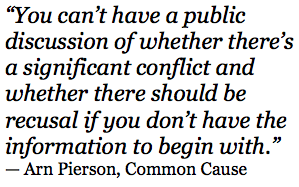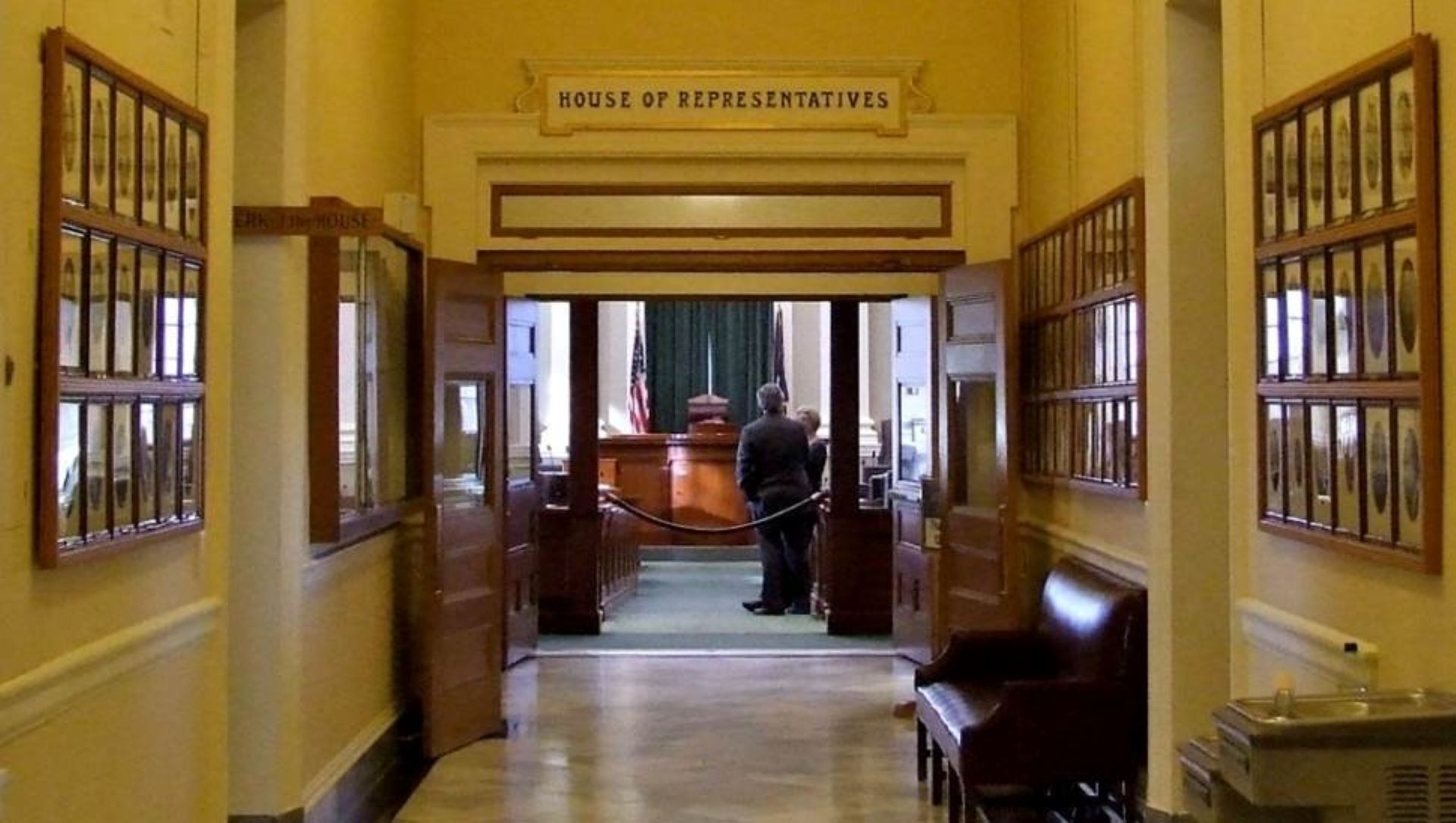Between 2003 and 2010, the state paid almost $235 million to private organizations run by legislative leaders or the spouses of high-level state officials.
But because of a loophole in state law, not one penny of that spending was ever disclosed to the public in ethics filings.
An investigation by the Maine Center for Public Interest Reporting has determined that the state paid millions of dollars to organizations associated with the following officials:
• Sen. Joseph Brannigan, D-Portland, chair of the Appropriations and Health and Human Services committees: $98 million to Shalom House, where Brannigan was executive director. Brannigan is still in the Legislature but has not been a member of those committees since 2011.
• Rep. Joseph Bruno, R-Raymond, House Minority Leader: $35.6 million to Goold Health Systems, where he was CEO and President, and $49 million to Community Pharmacies, where he was a board member of the controlling group. Bruno’s legislative service ended in 2004.
• Rep. Arthur Lerman, D-Augusta, member of the Appropriations Committee: $14 million to Support Solutions, Inc., where he was executive director. Lerman’s legislative service ended in 2006.
• Human Services Commissioner Brenda Harvey: $15.4 million to Mobius, Inc., where Harvey’s husband, David Lawlor, was executive director. Harvey resigned as commissioner in January 2011.
• Workmen’s Compensation Commission Deputy Director Steven Minkowsky: $21.6 million to Continuum Healthcare, where Minkowsky’s wife was CEO of four facilities owned by the group. Minkowsky retired from the commission in February 2011.
(Click to see the chart, State spending on organizations affiliated with legislative & executive branch leaders, fiscal years 2003-2010)
The failure to disclose such significant financial connections between the state and high-level public officials limits the public’s ability to hold government officials accountable, said Judy Nadler, senior fellow at the Markkula Center for Applied Ethics and former mayor of Santa Clara, California.
“It doesn’t matter what size your state or your city, you should always err on the side of disclosure, you cannot disclose enough,” Nadler said. “It’s all an effort to allow the public to have an open and transparent government so they know where the money’s coming from and going, who might be influencing decisions and any considerations that might lead a legislator to be unduly influenced.”
Each of the legislators or state officials says they did nothing wrong and that their statehouse colleagues knew of their overlapping private and public roles, thereby, they claim, creating a “check” on any possible conflicts of interest.
“I think it was well-known. Because I’d been here for a long time, I think everybody knew,” said Brannigan.
“My work as Executive Director of Support solutions,” wrote Lerman in an email to the Center, “was well known among my colleagues at the Legislature and others who frequented the State House.”
But Arn Pierson, vice president for programs at Common Cause in Washington, D.C., said that the informal system of legislators or executive branch officials being aware of each other’s potential conflicts isn’t good policy.
Citizens, said Pierson, deserve to know this information even more.
“You can’t have a public discussion of whether there’s a significant conflict and whether there should be recusal if you don’t have the information to begin with,” he said.
Only part of one of the cases uncovered by the Center has been public knowledge until now.
In 2000, the Washington, D.C. watchdog group, the Center for Public Integrity, revealed the state contracts that had gone to Bruno’s Goold Health Systems and that he had crafted legislation that benefited his pharmacy group.
While serving in the state legislature for two terms, wrote the Center’s Ken Vogel, Bruno “has used his political power in the Pine Tree State to benefit himself and both companies, one of which receives more than $10 million in taxpayer-funded contracts from the state.”
Bruno denied any conflict of interest. The Portland Press Herald and Bangor Daily News picked up the story and editorialized in favor of stronger legislative disclosure laws.
Those laws were never strengthened, and the tally has since mounted of millions in taxpayer dollars that have gone to organizations affiliated with statehouse leaders.
There are other legislators who worked for organizations that have gotten millions in state money, including Spurwink, Rumford Group Home, Little Angels Daycare, Community Counseling Center and Discovery House. Those legislators were not in influential positions, but the amounts paid to their employers by the state in fiscal year 2006 alone – not included in the $235 million — totalled more than $60 million.
The loophole that allows these potential conflicts to go unreported works this way: State law requires that legislators or high-level state employees report only state purchases of goods or services directly from the individual legislator or family member, not from a corporation or entity for which the legislator or family member works.
Each year, they fill out a form called, “Sources of Income.” Question No. 8 asks: “List each executive branch agency to which you or a member of your immediate family sold goods or services with a value in excess of $1,000 during the time period. Indicate whether you or a family member sold the goods or services. If none, check the box.”
Commissioner Harvey, whose husband was the executive director of a midcoast social services agency that got $5.6 million in state funding during fiscal year 2009, checked “none.” She was legally able to do that because the millions in state money did not go to her or her husband as individuals.
Likewise, Brannigan, Lerman and Bruno each checked “none” in response to the same question on the legislative disclosure forms, where the language is virtually the same as on the executive branch forms.
According to Phyllis Gardiner, an assistant attorney general, “The reporting obligation in section 1016-A(7) thus does not appear to encompass goods and services provided to an executive branch agency by a corporation that employs, or is owned by, the legislator.”
So, if legislator Mary Smith is an accountant and performs accounting services for the state for which she is paid more than $1000, she would have to disclose this under the requirement. But if legislator Mary Smith was the President of Accounting Associates, Inc. and performed the same work, she would not be required to disclose. Staff at the state’s Commission on Governmental Ethics, which receives and reviews legislative and executive disclosure statements, confirmed that this interpretation is correct.
“If that’s the limits of it, we’re missing a broad range of significant potential conflicts of interest,” said Pierson. “That interpretation is so narrow as to not make the law useful.”
Jonathan Wayne, the executive director of the state’s Commission on Governmental Ethics, said he, too, believes the law may be too limited in scope.
“I think it would certainly be better disclosure to the public if it were broadened to include organizations, whether non-profit or profit-making, that had a certain relationship to the official,” said Wayne.
“I think it’s just good for the public to know if public officials or members of their immediate family have significant contracts with the state.”
 But Brannigan questioned whether the public would be interested in his business dealings.
But Brannigan questioned whether the public would be interested in his business dealings.
“Would they know any more if you wrote it down on a piece of paper that nobody looks at,” he said.
The narrow financial disclosure law is at odds with policy in the state controller’s office, which prepares the annual audit of state finances. Each audit contains a section called, “Related party transactions,” which details financial transactions between the state and organizations run by high-level legislators, executive branch officials or their close family members.
Neria Douglass, a former Democratic legislator and now the state auditor, said related party transactions are listed because they provide “transparency” about financial dealings between high-level government officials and the state.
“It is a special type of potential conflict of interest or power to exert financial influence at a higher level than that of the ordinary individual,” said Douglass.
In Brannigan’s case, said Douglass, “Joe Brannigan could control an agency that received substantial funding from DHHS, and as a Representative, then Senator chairing the Joint Standing Committee on Health and Human Services, and later the Joint Standing Committee on Appropriations and Financial Affairs, he had some control of policies that affected this financial relationship. The notes to the financial statement provide disclosure of a relationship that rises to a level that has potential to affect the financial transactions between the parties.”
But citizens would have a hard time figuring out who was involved in such transactions if they read the audit without a list of legislators and their committee assignments. That’s because the audit contains no names and in some cases contains mistaken references to legislators, as in this example:
“The State of Maine pays a local company as a provider for mental health and independent living services through the MaineCare program.

The Executive Director of the Company also serves as House Chair of the Joint Standing Committee on Health and Human Services in the Maine Legislature. During fiscal 2010, the State paid $15.1 million for these services; $5.1 million from the General Fund and $10.0 million from the Federal Fund. At June 30, 2010, the State owed $189 thousand to this vendor.”
The section above, said Douglass in an email, should refer to Brannigan, the Senate Chair of the Committee on Health and Human Services. But it cites the “House Chair” of the Committee on Health and Human Services, who was Rep. Anne Perry, D-Calais.
“There was a typo/mistake in the financial statement notes for FY 2007, 2008, 2009 and 2010, which stated that the House Chair of the Joint Standing Committee on Health and Human Services had related-party transactions with the State of Maine,” wrote Douglass. “The note should have identified the legislator as the Senate Chair, not the House Chair.”
Likewise, the Related Party Transaction mistakenly notes for fiscal years 2008-2010 that “a family owned company” in which “a House Representative on the Utilities and Energy Committee” was a principal had provided $24.4 million worth of “road reconstruction” services. The legislator was Michael Thibodeau, R-Winterport — but his family sold the company in October, 2007.
“It appears he should not have been included in the disclosure for those years,” said Douglas Cotnoir, deputy state controller.
Senate President Kevin Raye, a Republican from Eastport, said that he was surprised to learn that the disclosure law failed to include businesses affiliated with a lawmaker or executive branch official.
“It almost strikes me that it’s an oversight or somehow wasn’t anticipated,” said Raye. “I would have thought we already were disclosing this.”
Raye said he would consider introducing legislation to fill the disclosure gap.
“I think it would be in keeping with the spirit of the disclosure law,” he said. “I’m perfectly comfortable with including this aspect under the existing law.”
Loophole means officials’ interests in final year in office remain secret
Citizens who want to understand the potential conflicts between private and public interests in the statehouse aren’t just handicapped by disclosures that don’t disclose much.
There are also the disclosures that don’t even exist.
A loophole in state ethics law means that lawmakers and executive branch officials who leave office between one year’s disclosure filing deadline and the next year’s filing deadline don’t have to file a disclosure for their last year (or portion of a year) in state government.
An example: Rep. Joseph Bruno, R-Raymond, left office at the end of 2004. Ethics commission staffer Cyndi Phillips had this response when asked for a copy of Bruno’s 2004 financial disclosure:
“Unfortunately, we do not have a disclosure form for Senator Bruno for 2004 because he would not have had to report until February 2005, when he no longer was in office.”
The disclosure law’s wording is at fault, said Jonathan Wayne, the commission’s executive director.
“It’s written so each legislator has the obligation to do that,” said Wayne. By the filing deadline for Bruno’s last year in office, “Joe Bruno was not a legislator. So under the way the statute was written, we wouldn’t expect to receive a statement for Mr. Bruno in 2004, which was his last year of service.”
It’s the same situation for executive branch officials who leave their jobs. There is no disclosure form on file, for example, for the last month-and-a-half that Kurt Adams served as chairman of the Public Utilities Commission in 2008.
“Kurt Adams was not required to file a statement because he left his position in May 2008 — 11 months before the reporting deadline,” said Wayne.
Wayne wrote that statement in May of 2010, adding that he and other members of the ethics commission staff believed this to be a loophole in the law.
“The Commission staff plans to propose some amendments to 1 MRSA 19, including instituting a reporting requirement for former employees,” wrote Wayne in an email.
“I’m not sure exactly what the proposed requirement will be, but it could be something along the lines of requiring managerial employees to file a statement for the current year upon the termination of their employment.”
That change has yet to be proposed by the Ethics Commission, but in December 2011, Wayne said it was an option the commission would consider for the next full legislative session in 2013.








